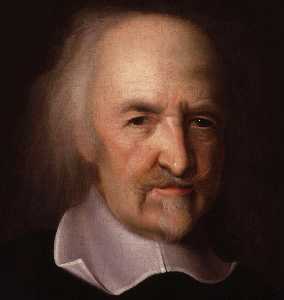anon_nowe said in #3467 9mo ago:

Strauss on Hobbes
>Political philosophy is independent of natural science because its principles are not borrowed from natural science, but are provided by experience, by the experience which every one has of himself, or, to put it more accurately, are discovered by the efforts of self-knowledge and the self-examination of every-one. As a result, evidence in political philosophy is of quite a different kind from evidence in natural science. On the one hand, it is much easier to understand : its subject and its concepts are not so remote from the average man as are the subject and concepts of mathematics which form the basis of natural science. On the other hand, 'the politiques are the harder study of the two'; by reason of their passions, men obscure the, in itself, clear and simple knowledge of the norms which political philosophy builds up. Moreover, man with his passions and his self-seeking is the particular subject of political philosophy, and man opposes by every kind of hypocrisy the self-knowledge on which the proof of these norms rests.
>According to Hobbes, political philosophy is not only independent of natural science, but it is the main component of human knowledge, of which the other main component is natural science.
On a first reading many may reject this dichotomy between political philosophy and natural science, as most will probably be naturally inclined to do on this board. What I find interesting however is that Thomas Hobbes himself had a mechanistic, materialistic view of the world, influenced by the rapid advances in astronomy and physics, by the thoughts of the likes of Kepler and Galileo. He thought that our wills, passions, desires, thoughts, were all produced through a mechanistic materialistic causality in our body, essentially through external stimuli--humans being complex machines whose behaviour is governed by these physical laws of motion.
This mechanistic foundation underlies both his moral and political philosophy. In this view human behavior is determined by appetites (attractions) and aversions (repulsions), which are themselves products of mechanical processes described. Reason is a process of logical calculation, and not an innate faculty tied to natural law (as in most of scholastic tradition).
I'm mostly thinking out loud but I'm wondering why he nonetheless claimed that political philosophy is independent of natural science, despite his materialistic views ? Did he not push his conclusions to their logical limit ? Can we save his reasoning somehow ?
>Political philosophy is independent of natural science because its principles are not borrowed from natural science, but are provided by experience, by the experience which every one has of himself, or, to put it more accurately, are discovered by the efforts of self-knowledge and the self-examination of every-one. As a result, evidence in political philosophy is of quite a different kind from evidence in natural science. On the one hand, it is much easier to understand : its subject and its concepts are not so remote from the average man as are the subject and concepts of mathematics which form the basis of natural science. On the other hand, 'the politiques are the harder study of the two'; by reason of their passions, men obscure the, in itself, clear and simple knowledge of the norms which political philosophy builds up. Moreover, man with his passions and his self-seeking is the particular subject of political philosophy, and man opposes by every kind of hypocrisy the self-knowledge on which the proof of these norms rests.
>According to Hobbes, political philosophy is not only independent of natural science, but it is the main component of human knowledge, of which the other main component is natural science.
On a first reading many may reject this dichotomy between political philosophy and natural science, as most will probably be naturally inclined to do on this board. What I find interesting however is that Thomas Hobbes himself had a mechanistic, materialistic view of the world, influenced by the rapid advances in astronomy and physics, by the thoughts of the likes of Kepler and Galileo. He thought that our wills, passions, desires, thoughts, were all produced through a mechanistic materialistic causality in our body, essentially through external stimuli--humans being complex machines whose behaviour is governed by these physical laws of motion.
This mechanistic foundation underlies both his moral and political philosophy. In this view human behavior is determined by appetites (attractions) and aversions (repulsions), which are themselves products of mechanical processes described. Reason is a process of logical calculation, and not an innate faculty tied to natural law (as in most of scholastic tradition).
I'm mostly thinking out loud but I'm wondering why he nonetheless claimed that political philosophy is independent of natural science, despite his materialistic views ? Did he not push his conclusions to their logical limit ? Can we save his reasoning somehow ?
referenced by: >>3473 >>3476
Strauss on Hobbes...